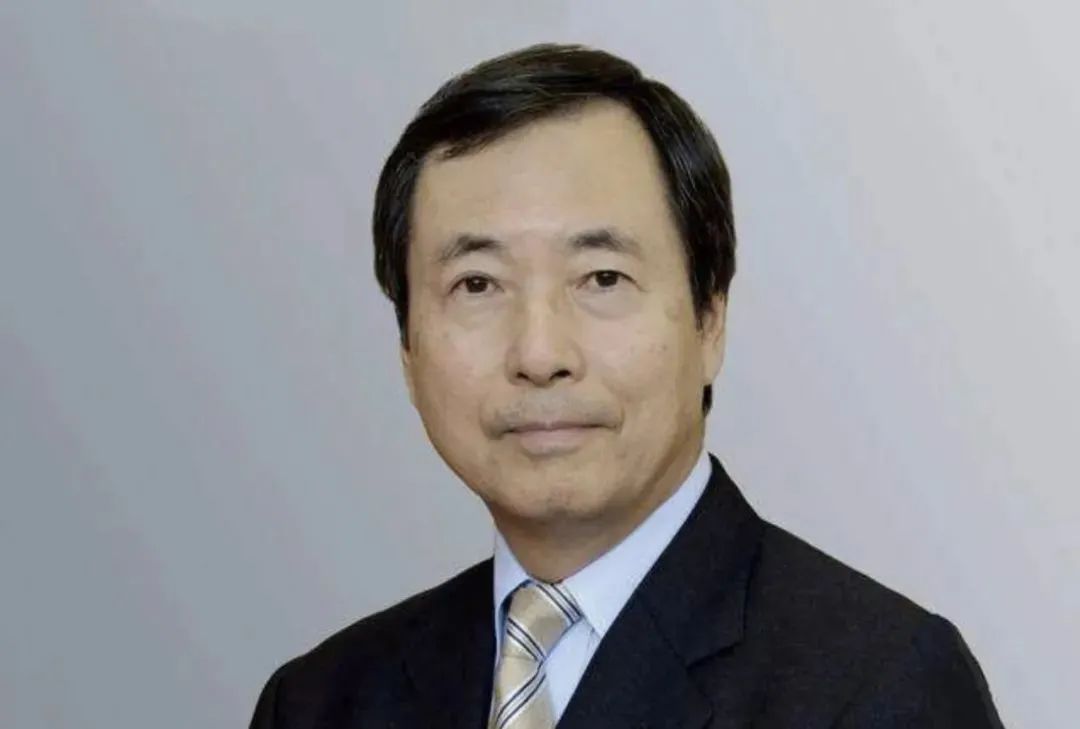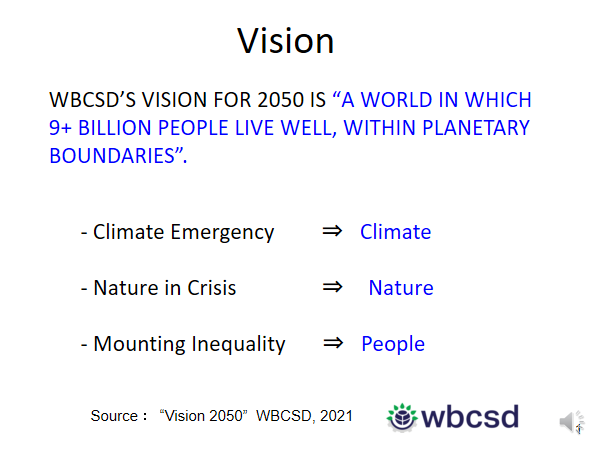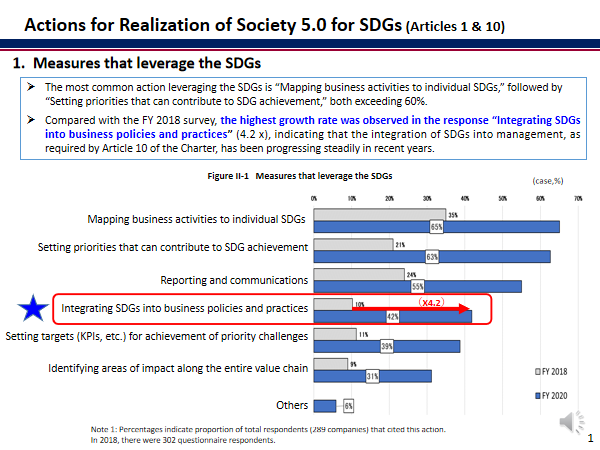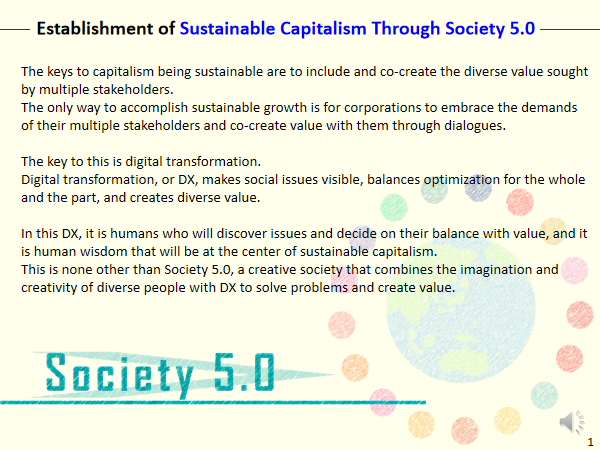
The 16th International CSR Forum with the theme of "30·60 Responsible Future" was held in Beijing on June 10, 2021. Representatives from all walks of life at home and abroad gathered here to exchange the CSR progress and development trends. Masao Seki, Chairman of Steering Committee of Council For Better Corporate Citizenship (CBCC), was invited to share the latest development and new growth strategy of Japan's sustainable development from a business perspective.
Action
Promoting sustainable development by the changes of Japanese enterprises
CBCC was established with the support of Keidanren, or Japan Business Federation. Keidanren is the most influential business organization in Japan with more than 1,400 member companies. Headed by Mr. Futamiya, Chairman of Sompo Japan Insurance, CBCC has been working on promoting CSR in Japan and having dialogue with stakeholders both home and abroad to promote understanding of Japanese companies' CSR initiatives.
In 2020, Keidanren conducts member surveys to monitor the penetration status of the Charter of Corporate Behavior revised in 2017. By comparing the results of 2018 and 2020, we find the changes include four aspects: incorporating SDGs into companies’ strategies,dialogue with SDG investors,business and human rights, and evaluating SDGs efforts.
Charter of Corporate Behavior is a convention reached among the member enterprises of the Federation of Japanese economic organizations, which is a restraint on the business behavior of the member enterprises in the spirit of the Charter. Although the Charter takes the conscious behavior of enterprises as the premise, according to the survey results carried out by Japanese Federation of Economic Organizations and CBCC, a large number of Japanese enterprises compile their own behavior norms and implementation rules according to the implementation guidelines for specific measures in the Charter. From this point of view, the Charter as a corporate social responsibility benchmark has great influence.
The first point is the growing penetration of SDGs and Society 5.0 for SDGs which was incorporated in the revised charter as a Keidanren’s strategy. Over the past years, efforts to address the SDGs have made significant progress, and you see in the middle of this slide that 4.2 times more companies are incorporating SDGs into their strategies than they were two years ago. This shows that in recent years, according to the requirements of the Charter of Corporate Behavior, Japanese enterprises have made steady progress in incorporating the UN SDG into their management.
The second point is about dialogue with stakeholders. As the survey result shows, there is a clear trend among companies to be very active in dialogue with stakeholders, especially with investors. More and more companies are having opportunities for individual dialogue with institutional investors on the theme of ESG and SDSs, in addition to IR meetings and general shareholder meetings. This indicates that investors in Japan are more interested in CSR and SDGs.
The third point is business and human rights. In the revision of the Keidanren Charter of Corporate Behavior in 2017, as part of our efforts to address SDGs, we strongly urged business initiative on human rights by establishing a new article of charter on "Respect for Human Rights." Looking at the survey result, 76% of responding companies already have or are trying to establish their human rights policy.
However, when it comes to concrete actions, in the two years from 2018, the percentage of companies practicing human rights due diligence in accordance with the UN Guiding Principles on Business and Human Rights has not increased and is still barely 30%. This point must be said to be one of the major challenges. To promote respect for human rights in business activities, the Government of Japan formulated the National Action Plan on Business and Human Rights in October 2020.
The last point of the survey result is about evaluating SDGs efforts. In order to avoid so-called SDG wash, it is necessary for business to evaluate its impact of SDG initiatives and communicate it to stakeholders. Japanese companies are recognizing the importance of this issue and are working on it. However, there is no uniform standard for enterprise evaluation methods. Different enterprises explore more appropriate and effective evaluation methods in the continuous trial and error. Keidanren is currently working on the proposal and guidance on such points.
Policy
Announcing new growth strategy
Next, I will introduce Keidanren's new growth strategy announced in November 2020. This strategy has been clarified with an eye to the post-COVID-19, further strengthening and developing the direction of actively addressing the SDGs announced in the revision of the Charter of Corporate Behavior.
Keidanren emphasizes that we business will consider the changing interests of diverse stakeholders, not just shareholder, and will respond to their demands. For example, changes in consumers, changes in employees, changes in communities, changes in the global environment, and changes in the natural environment.
The goal is to realize Sustainable Capitalism, and the key is to co-create value with stakeholders. As a core strategy, Japan have set out Society 5.0, and the engine that promotes it is digital transformation. Society 5.0 is a creative society which combines imagination and creativity of different groups with digital transformation to solve problems and create value.
According to the "Fifth Basic Plan of Science and Technology (2016-2020)" adopted by the cabinet meeting of Japan in January 2016, Society 5.0 (super intelligent society) is such a social form: "necessary products and services should be provided to the necessary people when necessary, so that everyone regardless of age, gender, region, language and other differences can be provided, Its various social needs can be fully met, so as to achieve a comfortable and dynamic society.
The goal of Social 5.0 is to make the society more optimized, more efficient, inclusive and sustainable. Therefore, Social 5.0 is closely related to the 17 goals of SDG.
Essence
Promoting transformation and change from 2030 to 2050
Last but not least, I would like to touch on a very important report, published on March 25th by WBCSD or World Business Council for Sustainable Development. The name of the report is “Vision 2050”, and the subtitle is “Time to transform”. It is being translated into many languages including Chinese and Japanese. 40 of Wbcsd's members were involved as project members, including 4 Japanese companies. They are Sompo Japan, Toyota, Fujitsu, and Mitsubishi Corporation. We have participated in this two-year study and discussion, and finally came up with this report.
WBCSD’s vision for 2050 is “A WORLD IN WHICH 9+ BILLION PEOPLE LIVE WELL, WITHIN PLANETARY BOUNDARIES”. It is a so easy-to-understand way to explain sustainable development. In order to achieve this, systemic and transformational change is necessary.

Through a comprehensive human centered approach, “Vision 2050: Time to transform” has formulated nine transformation paths, including energy, transportation and mobility, living spaces, products and materials, financial products and services, connectivity, health & well-being, water and sanitation, and food. These nine transformation paths detail the key transformation needed and the actions that can be taken at present, and provide an action framework for companies to meet the challenges.
In order to realize the transformation, we need to change three modes of thinking (reinvention, resilience, regeneration) and introduce four promoting factors (innovation & technology, finance & investment, individuals & consumption, policy & regulation). Only when these factors are combined and through systematic changes can the transformation be realized.
The most important thing is, that 2030, the target year of the SDGs, is by no means the final goal. This report strongly recommends to take on the challenge of transformation by aiming backwards from the vision 2050 and to act toward 2030 as a passing point. Based on this super long-term vision, I believe that we can work collectively with a strong will to transform society.
Scan the QR code to watch the video replay

- END -
















